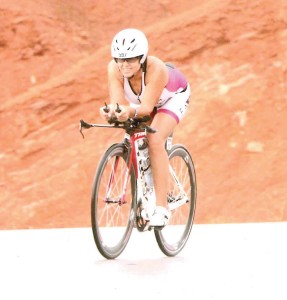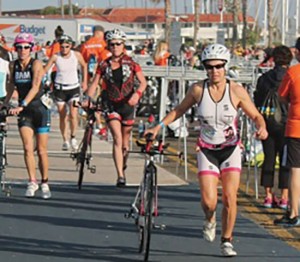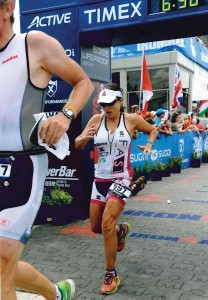 Highlighted Member
Highlighted Member
Shellie Clark, P# 4261
Height: 5’3″
Weight: 120
Years on the Department: 23 1/2
I understand you compete in triathlons. For those of us who are unfamiliar with a triathlon, it is made up of swimming, running and cycling, and it’s considered one of the most physically and mentally demanding competitions in the world. How long have you been competing, and how much of it is physical and how much of it is mental?
I have been competing for the last nine years. After completing a few marathons, I thought it would be fun to try a (sprint distance) triathlon. This consists of a leg that is a 1/2-mile swim, a leg that is a 12- to 14-mile bike ride, finally followed by a leg that is a 3.1-mile run. I considered myself to be in good shape because I regularly worked out two hours a day. How hard could it be? Well, I had a rude awakening. I practiced my swim in a pool, purchased a bike a week before the race and thought I was ready. I never practiced my swim in the lake, and when I jumped in the cold water, I had a panic attack. I literally doggy paddled the entire swim. I was the last one out of the water and was exhausted. I didn’t know how to change my gears on my new bike to climb the first hill. It was a three-loop course, so as I was getting passed, other competitors were yelling for me to “gear down” on the bike. I managed to pass one person on the run, and I finished second-to-last.
I have come a long way since my first race. I still learn something from every race I complete. I would say it is 50% physical and 50% mental. When you put in the work, you gain the mental strength you need to continue. You don’t have to be an athlete to do a triathlon. You just need to commit to the training. Anyone can do it. I’ve seen people competing in all shapes and sizes. If you want to get inspired, go watch the finish line at a long endurance race. I am always in tears watching people finish their event. It is hard to describe the feelings you have during those long training hours. I have cried a lot of tears, but I am not one to give up. It is amazing P# 1789 what your body is capable of doing.
How do you train for an upcoming competition? Do you incorporate other methods of training like weight lifting or other types of cardio?
I actually hired a trainer who provides me with a weekly schedule of my workouts that I can look up online. This usually entails six days of workouts consisting of three to four hours of swimming, six to 10 hours of cycling and up to three to seven hours of running throughout the week. I also do strength training two to three days a week, focusing on my core strength. Building your core is so important to prevent injuries and help with the long hours on the bike. I used to have the mindset that I needed to train as hard as I can every day in order to improve. I have learned you don’t have to go “all out” every day. My trainer has me use a heart-rate monitor now to help me with this. For example, on my long run days, I try to run at a two-minute-per-mile pace slower than my normal race pace. It’s all about getting the miles in your legs and working on faster leg rotation. Rest days are just as important. This is something I’ve really had to work on, but I’m learning to listen to my body. There are some days where I skip or shorten my workout if I feel really tired. Your body needs that recovery time.
It is also important to incorporate brick runs, which means running after you get off the bike. This is where I really have to work on my mental toughness. I am usually tired, and believe me, I want to quit, but I just tell myself to keep moving my legs. My schedules vary, but typically one day a week is my long day when I usually put in a three- to six-hour day. For an ironman, it builds up to an eight-hour day. (This is only for a few short weeks). It is really not as bad as it sounds.
 How does your diet now compare to your diet when preparing for a triathlon? Do you take any supplements that help with your training?
How does your diet now compare to your diet when preparing for a triathlon? Do you take any supplements that help with your training?
Dieting is the most difficult for me. I try not to get too crazy with my diet. When I am training for an event, I like to drop an additional five pounds. I try to cut out breads and pastas to lean myself out. My diet usually consists of protein shakes, salads with chicken, quinoa with steamed vegetables and either chicken or fish. The most important thing is to cut out sugar and empty calorie snacks. Basically, I like to make sure some protein is included in my snacks, such as almonds or yogurt.
On race day, I like to make oatmeal with almond milk. I add almond butter, which is similar to peanut butter, bananas and raisins. I still allow myself a skinny vanilla latte and an occasional glass of wine.
I do take supplements daily, and when I’m putting in a lot of training hours, I take them twice a day. I also use doTerra Essential oil vitamins and supplements. I also use the oils to help me with the stiffness and soreness. Deep Blue (similar to BenGay) is the best!
Fats are still important in your diet. I just try to make sure they are healthy fats, such as avocados, coconut oil or almonds. On my long training days, I don’t worry too much about what I eat. Sometimes some salty potato chips get you through the ride. I cannot say no to carrot cake, either. I do have my weaknesses. I try not to have the sugary snacks in my house. If I know it is there, I will probably eat it!
What is your next fitness goal? Do you have any upcoming competitions?
I am currently training for the Lake Tahoe Ironman, which is scheduled in September. An Ironman consists of a 2.4-mile swim in the lake, a 112-mile bike ride, followed by a 26.2-mile run. I was supposed to compete in this event last year, but was seriously injured while training on my bike two weeks before the race. I crashed on my bike while traveling about 25 miles per hour and flew off the bike about 20 feet, landing directly on the top of my head. I’m sure my helmet saved my life. When the doctor told me I broke my neck, I couldn’t believe it. I didn’t feel any pain. It just felt like whiplash. I remember crying when the doctor gave me the news. All I could think about was all the countless hours of training. I felt like I did it all for nothing. Then the doctor said something to me that put it all into perspective. He said, “You need to focus on what is important here. I am here to see two patients. You are going to walk again, but the other patient is not.” He then said the fact that I was in such great shape from my training is probably why my injuries weren’t more severe. My neck healed on its own without any surgery. I had to wear a neck brace for eight long weeks. I had a hard time just lying around, so I did a lot of walking. I also rode the stationary bike and used the stair climber at the gym. I felt better just to be moving. When I was able to remove the neck brace, I started doing yoga. This really helped me get my mobility back.
I recently competed in an Olympic distance triathlon, six months after my accident. I realized what a blessing it is that I am physically able to swim, bike and run. It poured rain during the entire event. I felt so alive to be on the bike again. The run is always the most painful, because you are always so tired by the third leg of the race. Instead of focusing on how tired I was, I focused on how lucky I am that I can still run. I ended up having one of my fastest run times.
I plan on competing as long as I physically can. My ultimate goal is to qualify for the Kona World Championship. Basically, you compete against other athletes in your general five-year age group. Different ironman races usually offer 50 qualifying spots for Kona. They determine how many slots they give to each age group according to how many people sign up for the race. Sometimes it is only two spots, which means you need to place first or second to qualify. If one of those athletes does not take the spot, it rolls down to the next-place finisher. I competed in a full ironman in Arizona back in 2013. I placed eighth out of 120 in my age group. I realize this is going to be a tough goal, but I believe I can do it. If nothing else, maybe I’ll qualify when I’m 70 (there are usually only five competitors in that age group, so my odds will be better!).
 How has being fit helped you to be a better police officer?
How has being fit helped you to be a better police officer?
I believe it should be mandatory that every police officer remains fit. I have always felt added pressure being a female. When I entered the Police Academy, I made sure I was prepared physically. Although I have never had an issue with anyone telling me a woman cannot do this job, I believe there are still people out there who don’t like us out there. I make it a priority to stay as fit as possible, so if I ever have to fight for my life or to help my partner, I know I physically can. I also believe we should take pride in our job and look good in our uniform. Whether we like it or not, we are being looked at and being evaluated constantly. It is not easy carrying an extra 25 pounds of gear in full uniform, but I still made it over those walls during foot pursuits when I was back in patrol. I think a lot of injuries could be prevented, if we all focused on building our core strength.
What advice would you give officers looking to adopt a healthier lifestyle?
Working as a police officer can be very stressful. We have a 24/7 job in which we work holidays and different shifts. Out in patrol, sometimes we get stuck on calls and miss our lunch. It’s easier and cheaper to make poor choices in the food we eat. I have seen officers go into the 7-Eleven and eat the free hot dogs and sodas. I would suggest packing healthy snacks, so when you do miss your lunch time, you have healthier choices. Eat smaller meals throughout the day to keep your metabolism moving. There is no secret pill to take. It takes some work, but it is so worth it. Working out should be like brushing your teeth; it should just be part of your daily routine. I like to sign up for events because it keeps me motivated to keep training. If I know I have a race coming up, I will get up early to get my run in. If you need motivation, there are Meetup groups, so you don’t have to do it alone. There are so many options available.
If you were the Sheriff, how would you incorporate fitness into the Department?
When I first hired on to the Department, we had gyms in the stations. This has all been taken away over the years. I don’t understand why fitness is not a priority with this job. When we all hired on, we were required to complete a fitness test. I don’t understand why we are not required to maintain this level of fitness. We should be required to pass a basic fitness test. We get incentive pay for having a degree. I think it would be a good idea to provide some type of incentive to remain fit. It doesn’t need to be money; it could be additional bonus time or even a fitness pin, like something similar to our shooting pin. I think the Department has done a great job with promoting different fitness events, such as Baker to Vegas, the Brass Challenge and several other 5K events. I’ve been called the day before an event asking if I will fill in for someone who had to cancel to run seven miles. I love knowing that I am ready anytime! I’m always looking for people to run or bike with. I would love to help anyone who is interested in trying a triathlon. You will be glad you did!

